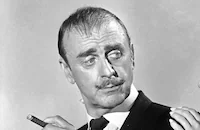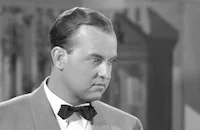Synopsis
Conman Latigo Smith, reluctant to relinquish his independence, sneaks off the train to Denver at the town of Purgatory while his bride-to-be, Goldie, a dance hall madam, is asleep. In Purgatory, owners of two rival mines, Colonel Ames and Taylor Barton, are racing against each other to find the mother lode of gold. When Taylor sees Latigo sneaking off the train, he assumes that he is Swifty Morgan, an infamous gunman he believes Ames has hired to prevent Taylor's miners from working the claim. Taylor's daughter Patience, a gun-toting tomboy, wants to shoot Latigo on sight, but Taylor says he has another plan for preventing the gunman from ruining them. While Taylor and his son Bud search Latigo's hotel room for proof of his identity, Patience shoots at Latigo from the balcony, so Taylor confiscates her rifle. While dodging both Patience's bullets and the mining explosions that rattle the town, Latigo searches for a doctor. Instead, he encounters hard-drinking Jug May, who wants to sell him the last thing he owns, a set of silver spurs, for money to eat. Claiming that money is the least of his worries, Latigo gives Jug five hundred dollars. After tracking down Doc Schultz at a saloon, Latigo offers him five hundred dollars to remove a tattoo on his chest that glorifies Goldie, but Doc says he must "read up" on the subject and tells him to return in a couple days. Outside, Patience tries to run over Latigo with her horse-drawn buggy and Taylor offers him "profitable employment," but Latigo evades them both. At the saloon, Latigo orders sarsaparilla and, when he sees the roulette wheel, bitterly describes to Jug how the house always controls the wheel so that winning is unlikely. Then, as if entranced, Latigo places a $4,600 bet on number 23 and loses. In shock, Latigo explains to Jug that sometimes the need to bet on the wheel "comes over him." Although broke, Latigo again refuses Taylor's job offer before giving him a chance to explain what it is. Upon learning from Jug that a woman, Jenny, runs a saloon, Latigo seeks her out, gives her the silver spurs, which he says were sent from a man he found dying on the prairie who claimed she was his true love. Softened by his romantic story, she takes him in. Later, after a man, thinking Latigo is Swifty, challenges him to a shootout, Latigo knocks him unconscious from behind and breaks the fingers of his gun hand. During a board meeting, Taylor explains to his two directors how he is trying to hire "Swifty" away from Ames, who has already blocked their mine's entrance with local gunmen. At the Ames farmhouse, the colonel's spinster sister Abigail gives Patience a letter to take to Taylor, whom she is secretly courting. Later, Patience poses as a dance hall girl and enters Latigo's hotel room. Brandishing a stick of dynamite, she says she must kill him so that she can go to Miss Hunter's College on the Hudson River for Young Ladies of Good Family. In explanation, she says that if her father's men do not find the mother lode before Ames's men, she will not be able to afford the school. Realizing that she, too, believes he is Swifty, Latigo shows her the inside of his boots, where the bootmaker stamped his name, and then has the maid throw her out. Doc says he can remove the tattoo, but now Latigo has no money with which to pay him. When Taylor and his two directors approach Latigo about working for them, Latigo claims that Jug is really Swifty and that he handles all his business transactions. Latigo then makes a deal for Swifty to remove Ames's gunmen from their mine entrance. By splitting the money and promising that he will not have to shoot, Latigo convinces Jug to impersonate Swifty. That evening, Latigo scares Ames's men away from the mine gate by saying that Swifty is now working for Taylor. After Taylor pays him, Latigo searches for Doc to remove his tattoo but finds him too drunk to operate. Hearing the whir of the roulette wheel, Latigo places $4,600 on number 23 and loses. Afterward, Patience sees Latigo beating his head against a post and sympathizes, claiming she often does so herself. Upon learning that he is originally from the Hudson River Valley where Miss Hunter's College is located, Patience becomes intrigued and they go for a walk. Near the Ames house, they see Ames's men abduct Taylor, who is returning Abigail after a buggy ride, and threaten to kill him. Patience despairs that now her father will never send her to Miss Hunter's College and Latigo notes that "on top of which he'll be dead." Intent on rescuing Taylor, Latigo enters the house and claims that he and Swifty intend to "make sure things are fair." Ames laughs, as if he is sharing a private joke, but releases Taylor. Searching for Latigo, Goldie arrives in town and is recognized by her friend Jenny, and they soon discover that Latigo told each of them the same story about the silver spurs. Angry at Latigo, they inadvertently cause a bar brawl, in which Latigo is knocked unconscious. Patience tries to revive him, but, discovering his tattoo, breaks a chair on his head. That night, people celebrate the re-opening of the Barton mine, while Patience frets to Latigo that his tattoo might be seen while they are married or "on a picnic." Ames, still amused, tells Latigo that he never really hired Swifty and purposely tricked Taylor into thinking he did, but has telegraphed the gunman to inform him that an imposter is using his name. After the dynamite set by Ames blows up Taylor's mine shaft, Ames declares the mine will remain closed until the real Swifty arrives. Fearing Swifty's reprisal, Latigo suggests to Jug that they leave town, but Jug refuses, as he naïvely believes he can outshoot Swifty. Patience begs Latigo to hide from Swifty, so that she is not reduced to marrying someone else if he is killed, but Latigo feels responsible for Jug's predicament and so stays in town. After Swifty challenges Latigo to a gunfight, Latigo meets Swifty on the street astride a mule with sticks of dynamite wrapped around him, hoping that Swifty will not risk shooting the dynamite and blowing himself up as well as the town. However, the gunman is confident of his ability and orders Latigo to draw. Just then, a mining explosion startles Swifty into accidentally shooting himself. The mule bucks and gallops into Jenny's saloon, where Latigo's dynamite explodes, revealing the mother lode, which Taylor is later able to claim. The explosion has also blown off Latigo's tattoo, prompting Patience to exclaim they can now marry and have a picnic. Using money paid by Taylor, Latigo bets on number 23 of the roulette wheel and wins. Later, he and Patience take the train to Denver to marry.































